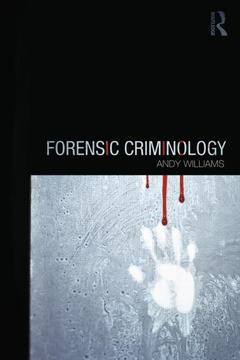Forensic Criminology

This text provides an examination of the aetiological development of forensic criminology in the UK. It links the subjects of scientific criminology, criminal investigations, crime scene investigation, forensic science and the legal system and it provides an introduction to the important processes that take place between the crime scene and the courtroom. These processes help identify, define and label the ?criminal? and are crucial for understanding any form of crime within society. The book includes sections on:
? the epistemological and ontological philosophies of the natural sciences;
? the birth of scientific criminology and its search for the criminal ?body?;
? the development of early forms of forensic science and crime scene investigation;
? investigating crime;
? information, material and evidence;
? crime analysis and crime mapping;
? scientific support and crime scene examination; and
? forensic science and detection methods and forensics in the courtroom.
The text combines coverage of historical research and contemporary criminal justice processes and provides an introduction to the most common forensic practices, procedures and uses that enable the identification and successful prosecution of criminals.
Forensic Criminology is essential for students of criminology, criminal justice, criminal investigations and crime science. It is also useful to those criminal justice practitioners wishing to gain a more in-depth understanding of the links between criminology, criminal investigations and forensics techniques.
1. Introduction Part 1: The Historical and Epistemological Backdrop 2. Constructed Knowledge and the Philosophy of Science 3. The Beginnings of 'Scientific Criminology' 4. The Beginnings of Forensic Investigation 5. The Beginnings of Criminal Investigation Part 2: Contemporary Forensic Investigations 6. Investigating Crime 7. Information Material and Evidence 8. Crime Analysis and Crime Mapping. 9. Scientific Support and Crime Scene Examination Part 3: Failsafe Forensics 10. Forensics Scientific and Detection Methods 11. Forensics on Trial.
Andy Williams is Principal Lecturer and Programme Area Leader at the Institute of Criminal Justice Studies at Portsmouth University. His main research areas are forensic criminology; forensic techniques and their uses and interpretation in court; dangerous offenders; public protection and offender profiling. His previous books include: The Anatomy of Serious Further Offending (Oxford University Press, with Mike Nash); The Handbook Of Public Protection (Willan, with Mike Nash); and The Myth of Moral Panics (Routledge, with Bill Thompson).
Date de parution : 08-2014
15.6x23.4 cm
Date de parution : 09-2014
15.6x23.4 cm
Thèmes de Forensic Criminology :
Mots-clés :
science; crime; scene; criminal; investigation; police; offi; cer; hans; gross; Forensic Criminology; UK Police Force; UK Criminal Justice System; Forensic Science; Crime Scene Examiner; Crime Scene Examination; Crime Scene; Inscriptive Device; DNA Profile; Forensic Identifi Cation Sciences; Metropolitan Police Forensic Science Laboratory; Crime Event; Crime Scene Report; Forensic Strategies; Defence Proposition; Police Forces; SARA; Crime Analysis; Crime Mapping; CA; Event Segments; Forensic Science Provision; Scientific Criminology; Situational Precipitators; SARA Model


